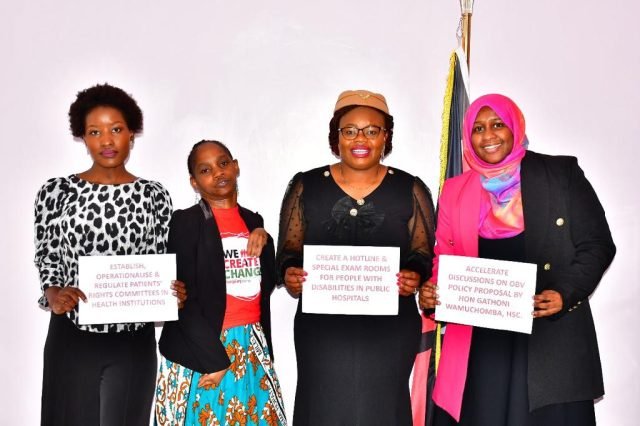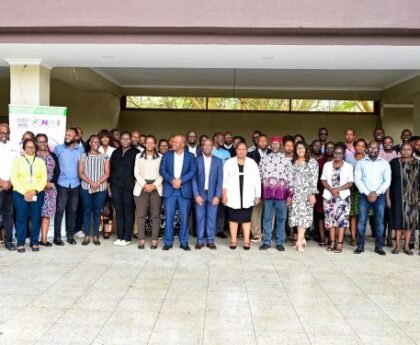Kenyan mothers are enduring egregious human rights breaches when seeking maternity care in medical facilities, according to strong evidence from a survey conducted by the Nguvu Collective on Obstetric Violence (OBV) encountered by women in Kenya.
Towards Ending OBV in Kenya: Unveiling the Invisible Wounds of Obstetric Violence Through the Voices of Kenyan Women is a qualitative survey that is the first of its kind to seek to reveal the prevalence of OBV in the nation. Responses to the poll came from 189 women from 27 counties in seven different provinces around the nation.
The survey’s main conclusions are as follows:
94% of participants did not disclose their OBV encounter because they believed that nothing would be done about it.
Eighty-three percent of those surveyed had experienced some kind of OBV.
Gross human rights violations, including coerced procedures, withholding of information, disregarding or denying concerns, denial of care, invasions of privacy and dignity, discrimination, and disregarding protocols or guidelines, accounted for 68% of the OBV incidents that the respondents reported.
Women with disabilities made up 11% of the survey participants, and 51% of the women were from homes with incomes below the poverty line. Women between the ages of 25 and 34 made up 46% of those who had experienced OBV.
In order to compile the testimonies of Kenyan women who had been victims of OBV, a poll was conducted. The Nguvu Change Leaders, Deborah Monari,Josephine Mwende, and Harriet Afandi, along with Ajra Mohamed, the Partnership Specialist for the Nguvu Collective, used an online survey for two months beginning in February 2024.
The purpose of the study was to get firsthand accounts of OBV experiences from Kenyan women.
The stories were gathered during a two month period beginning in February 2024 by Nguvu Change Leaders Harriet Afandi, Deborah Monari, and Josephine Mwende, as well as Nguvu Collective’s Partnership Specialist Ajra Mohamed, using phone interviews, in-person hospital visits, and online survey approaches.
The Mukuru Slums Development Projects (MSDP) and their partners (LVCT Kenya), the BrightHarriet Foundation, The Debra Show, AbleRise Africa Society, the GAMAFRICA Foundation (by Hon. MP Gathoni Wamuchomba), the Association for the Physically Disabled of Kenya (APDK), and the Centre for Advocacy and Awareness on the Rights of Youth-Africa (CAARY-AFRICA) were the partners in conducting the survey.
The following types of obstetric violence were identified by the survey:
- Sixty-two percent of cases involved psychological and emotional abuse, which includes verbal abuse and humiliation, dehumanising and impolite behaviour, and prejudice.
- 10% of cases involve physical abuse and coercion, such as punching, slapping, kicking, or restraining a woman during her pregnancy, childbirth, or the postpartum period. Other examples include forcing or manipulating women into accepting medical interventions or procedures they may not want or need.
- Medical malpractice, neglect, and needless interventions (28%) include refusals of care, filthy maternity environments, non-consensual pelvic exams, forced sterilisations, needless caesarean sections carried out without a medical reason, and incorrect or unnecessary prescriptions and recommended dosages.
According to Ajra Mohamed, the Nguvu Collective’s Partnerships Specialist, “OBV is a shocking reality that has seldom been spoken about publicly.” The fact that 94% of the women who took part in the study stated they felt no action would be taken, if they reported their OBV experience, is evidence of this.
Our survey serves as a sobering reminder of the human cost of obstetric violence, which poses a major risk to the advancement of maternal, newborn, and child health in the country.
Policies and procedures pertaining to maternity healthcare must be drastically changed.”The accounts of verbal, emotional, and physical abuse the women shared with us are deeply troubling and anguishing. We were disheartened to listen to their dehumanising experiences while accessing maternal health care. Every woman has the right to be treated with dignity. We cannot and should not ignore the stories that emerged through this survey. We plan to share the findings with key duty-bearers and request that they drive momentum in the Parliamentary debate on the need for a national policy on OBV,” shared Nguvu Change Leaders Harriet Afandi, Josephine Mwende, and Deborah Monari, the team behind “Towards Ending OBV in Kenya.”
In an attempt to break through this narrative of silence, Githunguri MP Gathoni Wamuchomba has been submitting a proposal for a national policy to combat OBV since last year. Parliament still needs to ratify it.
Additional significant findings
The majority of OBV instances recorded by respondents happened during childbirth, with 55% of respondents reporting mistreatment during this sensitive time, according to the study team. 27% of the events that were reported happened when a woman was pregnant, showing that mistreatment was not limited to the maternity ward.
The professions most likely to expose women to OBV were nursing (51%), then physicians, obstetricians, and gynaecologists (25%) and non-clinical workers (19%).
According to the survey, 13% of the documented OBV occurrences had a long-term detrimental effect on the health and development of the kid, while 9% of the incidents resulted in newborn fatalities. In contrast, 21% of OBV occurrences had long-term effects on the development and health of both the mother and the child.
In the future, the survivors who took part in the poll hope to see interventions that raise knowledge of women’s rights and compassionate maternity care. In order to properly address the issue, 97% of them emphasise the significance of explicit legislative actions.







